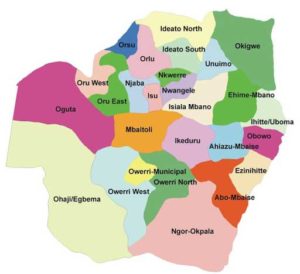Imo state is located in the south-eastern region of Nigeria. Named after the Imo River, it occupies the area between the lower River Niger and the upper and middle Imo River.
 The state is predominantly inhabited by Igbos with Christianity being the main religion. It shares boundaries with Abia state to the east, Delta state and River Niger to the West, Anambra to the North, and Rivers State to the South. Imo inhabitants are referred to as Imolites.
The state is predominantly inhabited by Igbos with Christianity being the main religion. It shares boundaries with Abia state to the east, Delta state and River Niger to the West, Anambra to the North, and Rivers State to the South. Imo inhabitants are referred to as Imolites.
Imo state is made up of 27 Local Government Areas (LGAs), with agriculture and Commerce as the state’s primary source of income. Imo is blessed with natural resources, rivers and lakes, and profitable crops and trees.
List of mineral resources in Imo state
Some major mineral resources found in Imo state include:
Crude Oil
Imo state is one of the oil-producing states in Nigeria. Crude oil can be found in some LGAs such as Ohaji/Egbema, Oguta, Oru East, Oru West, Obowo, Ngor Okpala, Iho in Ikeduru.
Natural Gas
Natural gas can also be found in some of the areas mentioned above.
Lead/Zinc
Lead and Zinc is used in the production of batteries, alloying, galvanizing steel to prevent rusting, etc. Lead-Zinc deposits can be found in some parts of Imo state.
Calcium Carbonate
Calcium carbonate is a natural resource found in chalk, limestone, marble, and other mineral forms. It is used for the production of dietary calcium supplements, building materials, and fillers for paper, paint, plastics and sealants.
Its deposits can be found in Umu-Obon and Okigwe.
Other resources are:
- White clay
- Fine sand
- Limestone
Major towns
- Owerri (State capital)
- Orlu
- Okigwe
- Obowo
- Oguta
- Obudi
- Mbaise
Agricultural resources
- Oil palm
- Iroko
- Mahogany
- Obeche
- Bamboo
- Rubber tree
